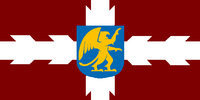History of Burgundie: Difference between revisions
mNo edit summary Tags: Mobile edit Mobile web edit Advanced mobile edit |
mNo edit summary Tags: Mobile edit Mobile web edit Advanced mobile edit |
||
| Line 23: | Line 23: | ||
===L'Intermezzo Splendide=== | ===L'Intermezzo Splendide=== | ||
The Splendid Interwar Period, ([[Burgoignesc language|Burg]]: ''le Intermezzo Splendide''), spanning [[1902]]-[[1934]] | The Splendid Interwar Period, ([[Burgoignesc language|Burg]]: ''le Intermezzo Splendide''), spanning [[1902]]-[[1934]] | ||
== Contemporary period == | |||
[[Second Great War]]-present | |||
===Second Great War=== | ===Second Great War=== | ||
| Line 28: | Line 31: | ||
([[1934]]-[[1943]]) | ([[1934]]-[[1943]]) | ||
===Le Troisieme Intermezzo=== | ===Le Troisieme Intermezzo=== | ||
[[1943]]-[[1964]] | [[1943]]-[[1964]] | ||
Revision as of 02:19, 6 April 2024
An abridged history of Burgundie. [ALL PREVIOUS HISTORY IN DISCUSSION BOX UNTIL I IRON OUT THE KINKS (ie. EX-NATIONS)] Burgundie, in its modern form, was founded as a series of Latinic trading posts in northern Levantia in the first century CE. Throughout history, it remained linguistically and religiously connected to Latinic roots, especially as the nations of Heku and Urcea formalized, but its social and economic culture is heavily influenced by the Gaelic and Germanic cultures it displaced and subsumed. The Isle of Burgundie remained the majority of the nation from its formation circa 853 until its explosive colonization of Alshar and southern Crona starting in the 16th century. During its war of independence, Burgundie also came to encompass the Kingdom of Ultmar, the predominantly Gaelic lands between the L'Estrech Alavarienne and the nations of Faneria and Fiannria.
Late modern period
People's Spring in Burgundie
The People's Spring of 1848 rocked the nascent establishment to its core. The socialist, anti-monarchist rebellions seeking independent republics of Burgundie, Ultmar and Flordeterra. The wedding of Great Prince Pau II in January of 1848 was so opulent and extravagant that it starved and impoverished many of the poor across Burgundie. Grain stores were expropriated, taxes were raised even further, and many workers were pressed into service to throng the parade route. Unlike his martial and resourceful father Pau I, Pau II was raised to be gentil and refined by his mother Maria-Isabel de Martilles. He was spoiled and reactionary, often choosing to micromanage his problems, regardless of his ability to do so knowledgeably. He was set to become an absolute ruler and the pomp and circumstance that he demanded for his wedding demonstrated that fact.
In the months after the wedding, the starving peasants across Burdeboch and Marves took up arms and raided government storehouses in search of food. The militias from the Isle of Burgundie and Marialanus, as well as the Gendarmes d'elite della Gaurdie Real (Elite Gendarmes of the Royal Guard) for the first time, were mobilized and violently suppressed the peasants.
First Fratricide
Main article: First Fratricide 1849-1875
Burgundie-Faramount Union

La Premier Intermezzo
First Great War
Main article: First Great War
L'Intermezzo Splendide
The Splendid Interwar Period, (Burg: le Intermezzo Splendide), spanning 1902-1934
Contemporary period
Second Great War-present